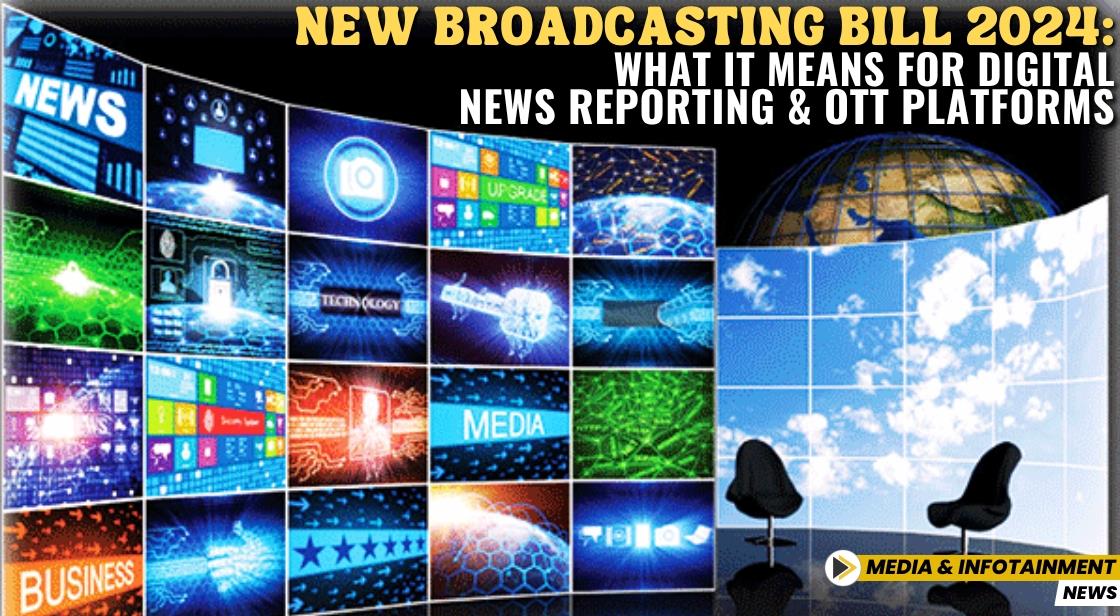New Broadcasting Bill 2024: What It Means for Digital News Reporting and OTT Platforms

News Synopsis
The Indian government has released a revised draft of the Broadcasting Services (Regulation) Bill, 2024, which aims to establish a comprehensive regulatory framework for the broadcasting sector. The bill seeks to address ambiguities identified in the previous draft and expand its scope to include digital news content and over-the-top (OTT) platforms.
Definition of News Broadcasters Under the New Bill
The updated draft introduces a broader definition of a ‘news broadcaster’. It defines a ‘professional’ as someone engaged in an occupation or vocation, while ‘systematic activity’ is described as “any structured or organized activity that involves an element of planning, method, continuity, or persistence.” Under the new regulations, ‘news and current affairs programmes’ will encompass not only “audio, visual, or audio-visual content, signs, signals, writing, and images” but also ‘texts’ transmitted directly or through broadcasting networks.
Impact on Digital Content Creators
The bill's definition of "professional" and "systematic activity" could have far-reaching implications for individual content creators who produce news-related content on social media platforms. If these creators meet the criteria of being professional and engaged in systematic activity, they could be classified as digital news broadcasters and subjected to the regulations outlined in the bill.
Regulation of OTT Platforms
While the previous draft explicitly mentioned OTT platforms, the revised bill adopts a different approach. OTT platforms are now categorized as "publishers of online curated content," bringing them under the ambit of the Information Technology (IT) Rules, 2021. This distinction suggests a tiered regulatory approach for different types of online content.
Consolidating Regulatory Framework
The government aims to streamline the broadcasting sector by replacing the existing Cable Television Networks (Regulation) Act, 1995, with the new broadcasting bill. This consolidation will create a unified regulatory framework for traditional broadcasting, digital news, and OTT platforms.
Potential Implications
The proposed regulations raise concerns about the impact on freedom of speech and expression, especially for individual content creators. The broad definition of news and current affairs could potentially stifle online discourse and innovation. Additionally, the regulatory burden on digital platforms may lead to increased costs and challenges in content moderation.
Conclusion
The revised Broadcasting Services (Regulation) Bill, 2024, represents a significant shift in how digital content and broadcasting are regulated in India. By potentially classifying individual content creators who focus on current affairs as digital news broadcasters, the bill aims to bring more comprehensive oversight to the growing digital media landscape.
This move, alongside the redefinition and regulation of OTT platforms as ‘publishers of online curated content’, indicates a broader attempt to consolidate and modernize the legal framework governing media and broadcasting.
The updated definitions and provisions reflect an effort to address the evolving nature of media consumption and content creation. As the bill replaces older regulations like the Cable Television Networks (Regulation) Act of 1995, it seeks to create a unified system that better fits today’s digital and media environment.
Stakeholders, including content creators and OTT platforms, should prepare for potential changes and compliance requirements. The introduction of this bill marks a pivotal moment in the regulation of digital broadcasting and media in India, setting the stage for future developments in the sector.
You May Like









